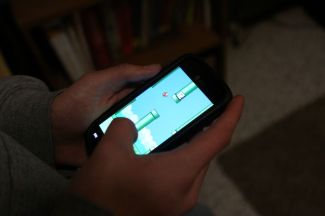Flappy Bird came about like most things today: taking the world by storm without warning. While available in the iTunes app store since May 2013, the game grew wings earlier this month, after it arrived on Android’s app store. The free app soared to be the most downloaded app in both stores by the first week of February.
The sudden success would be well-received by the mostly faceless developers behind the hundreds of thousands of mobile apps. The more flush they are, the more fine-tuned the apps. Not only do users win, but developers do too.
Of all people, however, the person most resistant to the game’s success was its creator, Dong Nguyen, a Vietnamese app developer for .GEARS Studios. According to Nguyen, Flappy Bird, just one of several pixelated, simplistic games created by the indie startup, was earning $50,000 per day in advertising. The large sum would have added up to about $1.5 million in just a month.
This, it appears, was too much for him. “I can call ‘Flappy Bird’ a success of mine. But it also ruins my simple life. So now I hate it,” he tweeted on Feb. 8.
The app, Nguyen announced in another tweet, would be pulled from app stores within 24 hours.
For millions of users, he provided a short window to grab the app before it would be discontinued. The result was a mad dash to the app store. Now that it is no longer available, devices with the apps installed are going for upwards of $1,000 on eBay.
But the million-dollar question remains. What drove Nguyen to turn away the fame and fortune for which most would do anything? What kept him from passing up the ends (monetary payment) to his means (developing quirky games)? Was he not aware of the total ecstasy that could swallow his boring life as an anonymous and independent developer?
Nguyen, with the little information he has provided on Twitter and his company website, has made it rather clear: He is not a man who sees wealth as the sign of success. He claims the fame ruined his “simple life.” On Feb. 8, he said, “I never sell my things.”
“I cannot take this anymore,” he tweeted that same day.
In response to a Twitter user who suggested he hire a social media team to deal with the unwanted attention, he said “I won’t. The PR will make me not an indie game maker anymore.”
.GEARS, the studio for which Nguyen works, defines itself as “a small, independent game developer based in Vietnam,” which seeks to make “arcade games that are bite-sized take no more than a few minutes of playing right on smartphones and tablets.” The unheard, independent niche is where the group finds itself fitting well. Moving beyond this in exchange for money would be betraying everything they claim to have aspired to be, all because one of its app went viral due to a stroke of luck.
For Americans, this is a novel idea. It is quite rare to see an individual turn down the opportunity to be part of the community of “underdogs” which we so enduringly celebrate.
In the end, however, Nguyen knew following the money and fame would change the kind of games the company makes. It would lead to a more demanding corporation and more nagging advertisers. It would change the character of the craft.
Freedom from this kind of pressure was more rewarding than anything the $50,000 per day could buy him.
While some Americans see the act as foolish, simpleminded and rash, it really is honorable. In a country where we emphasize an accord between personal achievement and monetary gain, we should acknowledge that the two are fundamentally independent from one another.
Not everyone is buying the idea of selling out.
Joseph Vitale, FCRH ’16, is an English major from Staten Island, N.Y.





